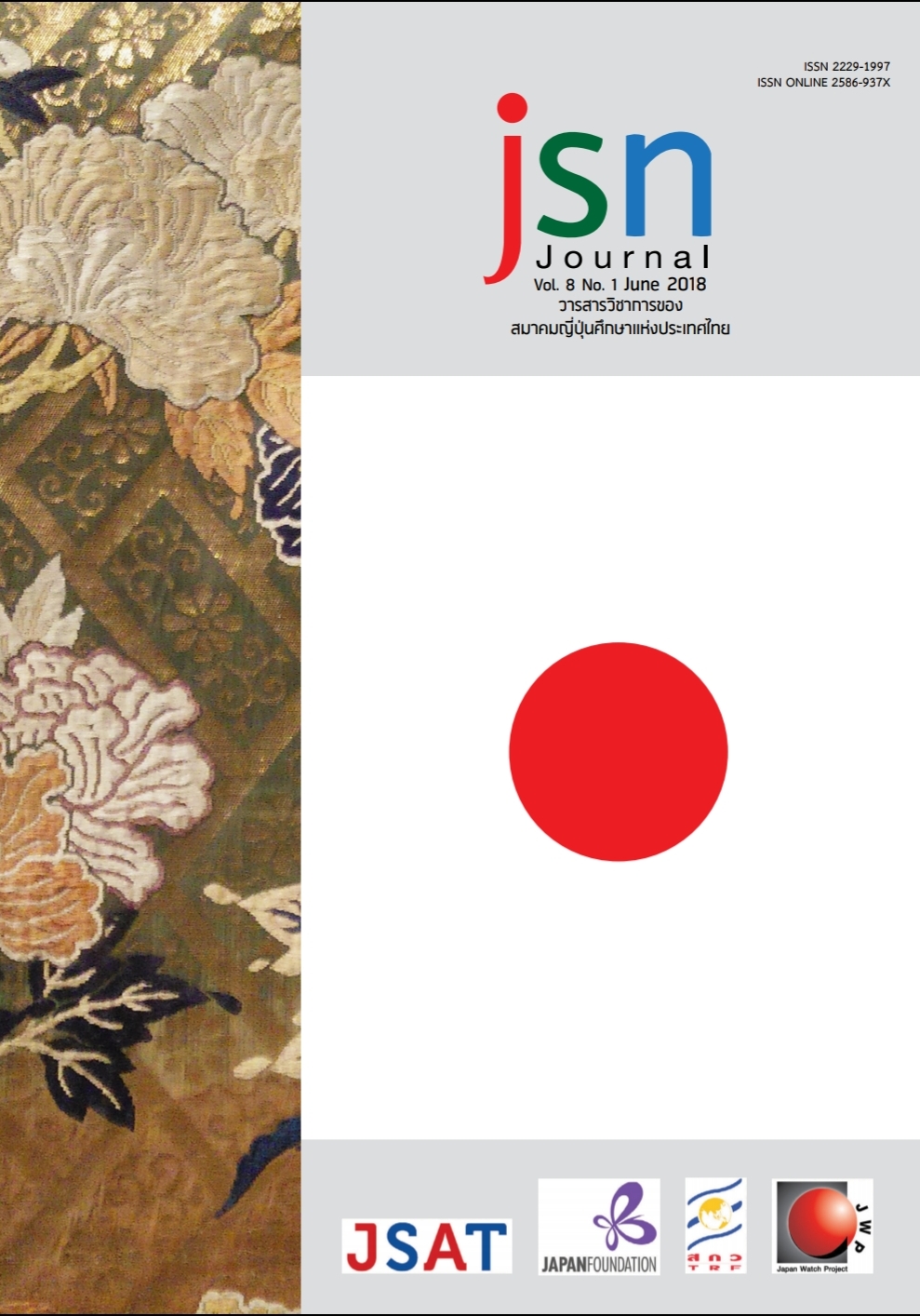Fair Trade Movement in Japan and Strengthening The Food Sovereignty of Smallholder Farmers in Developing Countries
Main Article Content
Abstract
companies and distributors, and therefore small producers in developing countries hardly have the opportunity to connect with Japanese consumers. In addition, Japanese fair trade is trade between traders in developing countries and Japanese traders rather than direct trade between producers in developing countries and Japanese traders. Thus Japanese fair trade does not differ from neoliberal trade or conventional trade, where traders seem to have more market power than producers. The fair trade movement in Japan has barely helped to improve the unequal power relations among producers, traders, and consumers in the current trade system.
Article Details
ข้อความและข้อคิดเห็นต่างๆ ในบทความเป็นของผู้เขียนบทความนั้นๆ ไม่ใช่ความเห็นของกองบรรณาธิการหรือของวารสาร jsn Journal
References
สิรินทิพย์ นรินทร์ศิลป์. (2560). ญี่ปุ่นอย่างที่เป็นลำดับที่ 3: ขบวนการการค้าที่เป็นธรรมในประเทศญี่ปุ่น. โครงการสันติไมตรีไทยญี่ปุ่น สำนักงานกองทุนสนับสนุนการวิจัย
Action Against Child Exploitation. (n.d.). Tackling Child Labour in the Cocoa Sector in Ghana. Retrieved from https://acejapan.org/english/ACE_choco.pdf
Bacon, Christopher M. (2010). Who Decides What Is Fair in Fair Trade? The Agri-environmental Governance of Standards, Access, and Price. Journal of Peasant Studies, 37(1), 111–47.
__________ (2015). Food Sovereignty, Food Security and Fair Trade: the Case of an Influential Nicaraguan Smallholder Cooperative. Third World Quarterly, 36(30), 469-488.
Burnett, Kimberly. (2017). Navigating the Land between Religions: New Perspectives on the Fair Trade and Food Sovereignty Movement Strategies to Challenge International Trade Governance. PhD Dissertation, Department of Global Governance, University of Waterloo.
Burnett, Kimberly and Sophia Murphy. (2013). What Place for International Trade in Food Sovereignty?. Food Sovereignty: A Critical Dialogue, International Conference on September 14-15, 2013, Program in Agrarian Studies, Yale University.
Chas, B. (n.d.). The New WFTO Guarantee System Draft. Retrieved from http://slideplayer.com/slide/4297032/
Fairtrade International. (2009). A Charter of Fairtrade Principles. Retrieved from http://fairtrade-advocacy.org/images/Charter_of_Fair_Trade_principles_EN_v1.2.pdf
__________ (2011). Fair Trade Glossary. Retrieved from https://www.fairtrade.net/fileadmin/user_upload/content/2009/about_fairtrade/2011-06-28_fair-trade-glossary_WFTO-FLO-FLOCERT.pdf
__________ (2014). Strong Producers Strong Future: Annual Report 2013-2014. Retrieved from http://www.fairtrade.org.za/uploads/files/Research/Facts_Figures/FLO_Annual_Report_2013_2014.pdf
__________ (2016). Global Fairtrade Sales by Country. Retrieved from https://annualreport15-16.fairtrade.net/en/power-in-partnership/
__________ (2017). Global Fairtrade Sales by Country. Retrieved from https://annualreport16-17. fairtrade.net/en/building-fairtrade-markets/
__________ .(n.d.). History of Fairtrade. Retrieved from https://www.fairtrade.net/about-fairtrade/history-of-fairtrade.html
__________ (n.d.). Our Fairtrade Certification Standard Operating Procedures. Retrieved from https://www.flocert.net/start-trading-fair-today/
Fairtrade Label Japan. (n.d.). Trends in Japan’s Fair Trade Certified Product Market. Retrievedfrom http://www.fairtrade-jp.org/about_fairtrade/000017.html
__________ (n.d.)What is FLJ. Retrieved from http://www.fairtrade-jp.org/about_us/
FLOCERT. (n.d.). Customer Search. Retrieved from https://www.flocert.net/about-flocert/customer-search/
Goff, Sarah C. (2016). Fair trade: Global Problems and Individual Responsibilities. Critical Review of International Social and Political Philosophy. Retrieved from http://dx.doi.org/10.1080/13698230.2016.1252993
Ikegami, K. & Uyama, M. (2003). Features and Challenges of Fair Trade Movement in Japan. Retrieved from http://fr.pekea-fr.org/Dakar/D-T/T-D-Ikegami.doc.
Ikegami, K. (2005). Implication of Organic Agriculture Movement for Fair Trade Movement in Japan. Retrieved from http://www.pekea-fr.org/doc/rennes2005/ikegamirennnove05.pdf.
The International Nyéléni Newsletter. (2007a). Declaration of the Forum for Food Sovereignty, Nyéléni 2007. Retrieved from http://nyeleni.org/spip.php?article290
__________ (2007b). Nyeleni 2007 - Forum for Food Sovereignty Synthesis Report. Retrieved from http://nyeleni.org/spip.php?article334
Institute for International trade and Investment. (2009). Japan’s Fair Trade Market Survey Report 2008. Committee on Fair Trade Studies. Retrieved from https://european-fair-trade-association.org/efta/Doc/FT-in-Japan2008.pdf.
Jaffee, D. (2007). Brewing Justice: Fair Trade Coffee, Sustainability, and Survival.Berkeley: University of California Press
Jaffee, D., Kloppenburg, Jack R. & Monroy Mario B. (2004). Bringing the “Moral Charge” Home: Fair Trade within the North and within the South.Rural Sociology, 69(2), 169-196.
La Via Campesina. (1996). Food Sovereignty: A Future without Hunger. Retrieved from http://www.acordinternational.org/silo/files/decfoodsov1996.pdf
Moore, G. (2004). The Fair Trade Movement: Parameters, Issues and Future Research. Journal of business ethics,53(1-2), 73-86.
Naylor, Lindsay B. (2014). Decolonial Autonomies: Fair Trade, Subsistence and the Everyday Practice of Food Sovereignty in the Highlands of Chiapas. PhD Dissertation, Department of Geography, Graduate School of the University of Oregon.
Specialty Coffee Wataru Online Shop. (n.d.). Fair Trade certification. Retrieved from https://www.specialty- coffee.jp/products/list?country_origin=&breed=&tag=2&coffee_pyramid=& product_template=1&product_weight_price_range=
Sylla, Ndongo Samba. (2014). The Fair Trade Sandal: Marketing Poverty to Benefit the Rich. London: Pluto Press.
Taylor, Peter. (2002). Poverty Alleviation through Participation in Fair Trade Coffee Networks: Synthesis of Case Study Research Question Findings. New York: Fair Trade Research Group/Colorado State University/Ford Foundation.
The International Nyéléni Newsletter. (2007). Nyeleni 2007 Forum for Food Sovereignty. Retrieved from https://nyeleni.org/DOWNLOADS/Nyelni_EN.pdf
Torgerson, Anna McLoughlin. (2009). Fair Trade Banana Production in the Windward Islands: Local Survival and Global Resistance. Agriculture and Human Values, 27(4), 475–87.
World Fair Trade Organization. (2004). History of Fair Trade: 60 Years of Fair Trade: A Brief History of the Fair Trade Movement. Retrieved from http://wfto.com/about-us/history-wfto/history-fair-trade
__________ (2014). WFTO Guarantee System Handbook: WFTO Fair Trade Standard. Retrieved from http://wfto.com/sites/default/files/Ch-6-WFTO-Fair-Trade-Standard-draft-3.6-feb-14.pdf
__________ (n.d.). Search Members/Suppliers. Retrieved from https://www.wfto.com/find-supplier
__________ (n.d.). How to Join WFTO. Retrieved from https://wfto.com/members-and-products/how-join-wfto
Zerbe, Noah. (2014) “Exploring the Limits of Fair Trade: The Local Food Movement in the Context of Late Capitalism”. In Globalization and Food Sovereignty: Global and Local Chance in the New Politics of Food, edited by Andree, Peter et al Canada: University of Toronto Press.
สัมภาษณ์
AEON. (December 8, 2017). Tokyo Prefecture. Personal interview.
En Shop. (June 11, 2017). Hiroshima Prefecture. Personal interview.
Japan Fair Trade Committee. (JFTC). (June 11, 2017).
Kumamoto Prefecture. Personal interview.Kumamoto International Foundation. (June 11, 2017). Kumamoto Prefecture. Personal interview.
Labotech Co.,Ltd. (June 13, 2017). Kumamoto Prefecture. Personal interview.
Loveland Shop. (June 12, 2017). Kumamoto Prefecture. Personal interview.
One Planet Paper. (June 12, 2017). Kumamoto Prefecture. Personal interview.


